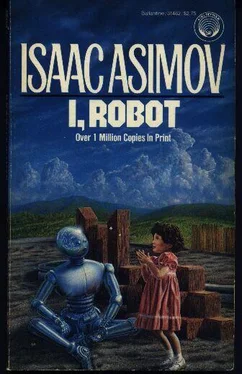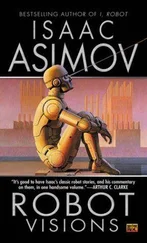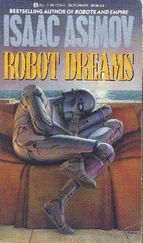Isaac Asimov - I, Robot
Здесь есть возможность читать онлайн «Isaac Asimov - I, Robot» весь текст электронной книги совершенно бесплатно (целиком полную версию без сокращений). В некоторых случаях можно слушать аудио, скачать через торрент в формате fb2 и присутствует краткое содержание. Жанр: Фантастика и фэнтези, на английском языке. Описание произведения, (предисловие) а так же отзывы посетителей доступны на портале библиотеки ЛибКат.
- Название:I, Robot
- Автор:
- Жанр:
- Год:неизвестен
- ISBN:нет данных
- Рейтинг книги:5 / 5. Голосов: 2
-
Избранное:Добавить в избранное
- Отзывы:
-
Ваша оценка:
- 100
- 1
- 2
- 3
- 4
- 5
I, Robot: краткое содержание, описание и аннотация
Предлагаем к чтению аннотацию, описание, краткое содержание или предисловие (зависит от того, что написал сам автор книги «I, Robot»). Если вы не нашли необходимую информацию о книге — напишите в комментариях, мы постараемся отыскать её.
I, Robot — читать онлайн бесплатно полную книгу (весь текст) целиком
Ниже представлен текст книги, разбитый по страницам. Система сохранения места последней прочитанной страницы, позволяет с удобством читать онлайн бесплатно книгу «I, Robot», без необходимости каждый раз заново искать на чём Вы остановились. Поставьте закладку, и сможете в любой момент перейти на страницу, на которой закончили чтение.
Интервал:
Закладка:
"What does that mean?" cried Calvin. "Only that you didn't want him to give you the solution. It would puncture your ego to have a machine do what you couldn't. Did you ask him?" she shot at Bogert.
"In a way." Bogert coughed and reddened. "He told me he knew very little about mathematics."
Lanning laughed, not very loudly and the psychologist smiled caustically. She said, "I'll ask him! A solution by him won't hurt my ego" She raised her voice into a cold, imperative, "Come here!"
Herbie rose and approached with hesitant steps.
"You know, I suppose," she continued, "just exactly at what point in the assembly an extraneous factor was introduced or an essential one left out."
"Yes," said Herbie, in tones barely heard.
"Hold on," broke in Bogert angrily. "That's not necessary true. You want to hear that, that's all."
"Don't be a fool," replied Calvin. "He certainly knows as much math as you and Lanning together, since he can read minds. Give him his chance."
The mathematician subsided, and Calvin continued, "All right, then, Herbie, give! We're waiting." And in an aside, "Get pencils and paper, gentlemen."
But Herbie remained silent, and there was triumph in the psychologist's voice, "Why don't you answer, Herbie?"
The robot blurted out suddenly, "I cannot. You know I cannot! Dr. Bogert and Dr. Lanning don't want me to."
"They want the solution."
"But not from me."
Lanning broke in, speaking slowly and distinctly, "Don't be foolish, Herbie. We do want you to tell us."
Bogert nodded curtly.
Herbie's voice rose to wild heights, "What's the use of saying that? Don't you suppose that I can see past the superficial skin of your mind? Down below, you don't want me to. I'm a machine, given the imitation of life only by virtue of the positronic interplay in my brain-which is man's device. You can't lose face to me without being hurt. That is deep in your mind and won't be erased. I can't give the solution."
"We'll leave," said Dr. Lanning. "Tell Calvin."
"That would make no difference," cried Herbie, "since you would know anyway that it was I that was supplying the answer."
Calvin resumed, "But you understand, Herbie, that despite that, Drs. Lanning and Bogert want that solution."
"By their own efforts!" insisted Herbie.
"But they want it, and the fact that you have it and won't give it hurts them. You see that, don't you?"
"Yes! Yes!"
"And if you tell them that will hurt them, too"
"Yes! Yes!" Herbie was retreating slowly, and step by step Susan Calvin advanced. The two men watched in frozen bewilderment.
"You can't tell them," droned the psychologist slowly, "because that would hurt and you mustn't hurt. But if you don't tell them, you hurt, so you must tell them. And if you do, you will hurt and you mustn't, so you can't tell them; but if you don't, you hurt, so you must; but if you do, you hurt, so you mustn't; but if you don't, you hurt, so you must; but if you do, you-"
Herbie was up against the wall, and here he dropped to his knees. "Stop!" he shrieked. "Close your mind! It is full of pain and frustration and hate! I didn't mean it, I tell you! I tried to help! I told you what you wanted to hear. I had to!"
The psychologist paid no attention. "You must tell them, but if you do, you hurt, so you mustn't; but if you don't, you hurt, so you must; but-"
And Herbie screamed!
It was like the whistling of a piccolo many times magnified – shrill and shriller till it keened with the terror of a lost soul and filled the room with the piercingness of itself.
And when it died into nothingness, Herbie collapsed into a huddled heap of motionless metal.
Bogert's face was bloodless, "He's dead!"
"No!" Susan Calvin burst into body-racking gusts of wild laughter, "not dead – merely insane. I confronted him with the insoluble dilemma, and he broke down. You can scrap him now-because he'll never speak again."
Lanning was on his knees beside the thing that had been Herbie. His fingers touched the cold, unresponsive metal face and he shuddered. "You did that on purpose." He rose and faced her, face contorted.
"What if I did? You can't help it now." And in a sudden access of bitterness, "He deserved it."
The director seized the paralysed, motionless Bogert by the wrist, "What's the difference. Come, Peter." He sighed, "A thinking robot of this type is worthless anyway." His eyes were old and tired, and he repeated, "Come, Peter!"
It was minutes after the two scientists left that Dr. Susan Calvin regained part of her mental equilibrium. Slowly, her eyes turned to the living-dead Herbie and the tightness returned to her face. Long she stared while the triumph faded and the helpless frustration returned – and of all her turbulent thoughts only one infinitely bitter word passed her lips.
"Liar!"
That finished it for then, naturally. I knew I couldn't get any more out of her after that. She just sat there behind her desk, her white face cold and – remembering.
I said, "Thank you, Dr. Calvin!" but she didn't answer. It was two days before I could get to see her again.
Little Lost Robot
WHEN I DID SEE SUSAN CALVIN AGAIN, IT WAS AT the door of her office. Files were being moved out.
She said, "How are your articles coming along, young man?"
"Fine," I said. I had put them into shape according to my own lights, dramatized the bare bones of her recital, added the conversation and little touches, "Would you look over them and see if I haven't been libellous or too unreasonably inaccurate anywhere?"
"I suppose so. Shall we retire to the Executives' Lounge? We can have coffee."
She seemed in good humor, so I chanced it as we walked down the corridor, "I was wondering, Dr. Calvin-"
"Yes?"
"If you would tell me more concerning the history of robotics."
"Surely you have what you want, young man."
"In a way. But these incidents I have written up don't apply much to the modern world. I mean, there was only one mind-reading robot ever developed, and Space-Stations are already outmoded and in disuse, and robot mining is taken for granted. What about interstellar travel? It's only been about twenty years since the hyperatomic motor was invented and it's well known that it was a robotic invention. What is the truth about it?"
"Interstellar travel?" She was thoughtful. We were in the lounge, and I ordered a full dinner. She just had coffee.
"It wasn't a simple robotic invention, you know; not just like that. But, of course, until we developed the Brain, we didn't get very far. But we tried; we really tried. My first connection (directly, that is) with interstellar research was in 2029, when a robot was lost-"
Measures on Hyper Base had been taken in a sort of rattling fury – the muscular equivalent of an hysterical shriek.
To itemize them in order of both chronology and desperation, they were:
1. All work on the Hyperatomic Drive through all the space volume occupied by the Stations of the Twenty-Seventh Asteroidal Grouping came to a halt.
2. That entire volume of space was nipped out of the System, practically speaking. No one entered without permission. No one left under any conditions.
3. By special government patrol ship, Drs. Susan Calvin and Peter Bogert, respectively Head Psychologist and Mathematical Director of United States Robot amp; Mechanical Men Corporation, were brought to Hyper Base.
Susan Calvin had never left the surface of Earth before, and had no perceptible desire to leave it this time. In an age of Atomic Power and a clearly coming Hyperatomic Drive, she remained quietly provincial. So she was dissatisfied with her trip and unconvinced of the emergency, and every line of her plain, middle-aged face showed it clearly enough during her first dinner at Hyper Base.
Читать дальшеИнтервал:
Закладка:
Похожие книги на «I, Robot»
Представляем Вашему вниманию похожие книги на «I, Robot» списком для выбора. Мы отобрали схожую по названию и смыслу литературу в надежде предоставить читателям больше вариантов отыскать новые, интересные, ещё непрочитанные произведения.
Обсуждение, отзывы о книге «I, Robot» и просто собственные мнения читателей. Оставьте ваши комментарии, напишите, что Вы думаете о произведении, его смысле или главных героях. Укажите что конкретно понравилось, а что нет, и почему Вы так считаете.








